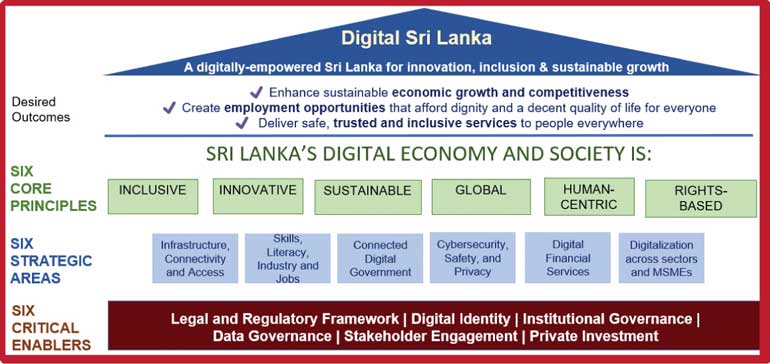Wednesday Feb 18, 2026
Wednesday Feb 18, 2026
Wednesday, 24 April 2024 00:00 - - {{hitsCtrl.values.hits}}

President Ranil Wickremesinghe

The Government has unveiled a comprehensive national digital strategy for Sri Lanka titled “Digital Sri Lanka 2030” along with an implementation plan.
The vision for 2030 is to have: a digitally empowered Sri Lanka for innovation, inclusion and sustainable growth.
To achieve the desired outcomes, the national digital strategy for Sri Lanka includes actions across six strategic areas. Underpinning these areas are six core principles and six critical enablers.
The six core principles are; inclusive, innovative, sustainable, global, human-centric and rights-based.
The six strategic areas are infrastructure connectivity and access, skills, literacy, industry and jobs; connected digital government; cyber security, safety and privacy; digital financial services and digitisation across sectors and SMEs.
The six critical enablers are legal and regulatory framework; digital identity; institutional governance; data governance; stakeholder engagement and private investment.
According to the Ministry of Technology, the focus moving forward is on developing the Sri Lankan digital ecosystem as a core component of a more-vibrant, socially inclusive, export-oriented, and green
economy.
The national digital strategy will be an integral part of the country’s economic recovery and growth between now and 2030 and will be implemented in phases. In the first phase, over the next two years (until the end of 2025), the emphasis will be on setting the stage through reforms and selected investments to position the country for recovery. This will require strengthening institutions to rebuild the business climate, attracting private investment, and driving service exports, whilst ensuring that inclusive and improved digital services support improved governance and accountability.
Beyond 2026, the focus will shift to strategically positioning the country as a digital innovation and entrepreneurship hub in the Asia-Pacific, investing in the future of technology and jobs, and fully integrating digital technology across all of society and the economy.
The strategy recognises the importance of building a robust, export-oriented economy, and the need to create strong economic and technological partnerships with partners around the world. For the country to be successful in its journey towards digital transformation while minimising the reliance on public financing, a vibrant private sector will be a key partner.
In addition, measures to enhance regulatory capacity, efficient use of public investments and assets, and greater social inclusion will be critical for sustainable development.
The national digital strategy, with its associated implementation plan, should be seen as a living document that will keep pace with the constantly evolving global digital economy and achieve the country’s vision of becoming a high-income economy by 2048.
Desired outcomes include sustainable economic growth and competitiveness, greater social inclusion, a stronger skills base, good and well-paying jobs with dignity, and trusted and inclusive services. The focus is to reconstruct, rebuild and set the stage for the future of Sri Lanka’s digital landscape.
This will also require constant monitoring and evaluation to ensure that the country invests wisely in its digital foundations.
This strategy also builds on, and learns from, earlier efforts—including policies, strategies, and frameworks—to grow the digital economy and integrate digital elements in trade and economic growth, governance, and social services, as proposed and promoted by the government, industry associations, and public agencies.
The strategy recognises that for the successful implementation of Sri Lanka’s digital strategy, a solid institutional framework with clear structures and enabling policy frameworks is crucial.
Efficient coordination, resource allocation, and transparent accountability mechanisms will be established. Coordinated efforts between government agencies, the private sector, and other stakeholders will be encouraged. Overall, these measures will drive digital adoption, foster innovation, and promote economic growth and competitiveness in Sri Lanka.
Institutional arrangements for the implementation of Sri Lanka’s digital strategy will be based on the following principles,
Bullets
High-level ownership by the President and Cabinet committee, with parliamentary committee oversight: Having high-level ownership from the President and Cabinet committee ensures alignment with national goals and enables critical decision-making. Parliamentary committee oversight provides transparency and accountability
A single empowered body, under the office of the President and with a clearly defined mandate, responsible for overseeing and guiding the implementation of the digital strategy: A single body will provide clear leadership, coordination, and accountability for the successful implementation of the strategy, while monitoring and evaluation mechanisms will ensure adaptability and evidence-based decision making
Implementing partners that will include many of the existing agencies, suitably staffed and capacitated, such as TRCSL, Data Protection Authority (DPA), Cyber Security Agency, Central Bank, Ministries, and private sector partners
Collaboration with existing government agencies, academic institutions, civil society organisations, private sector partners and other stakeholders will leverage their expertise and resources, promoting inclusive growth and needs-based innovation
A suitably empowered digital government agency with a mandate focused on the technical aspects of the connected digital Government: This agency would be responsible for the technical elements of a connected digital Government that would play a critical role in enabling efficient, secure, and integrated digital services
The strategy also proposes a new Digital Government Agency (DigiGov) tasked with development of the Digital Government Blueprint and implement digital strategies; build, manage, and operate Whole-of-Government (WOG) digital infrastructure and products in collaboration with public and private sector agencies; build, manage and operate Government-wide shared applications and services in collaboration with public and private sector agencies; establish, oversee, and support compliance to digital policies and standards; provide technical expertise, advice, and support across the Government to support digital transformation, including to work across the public sector to develop and support strategic sectoral digital products and increase digital capabilities within the public sector.
The Technology Ministry noted that the adoption of government-wide initiatives to stimulate the digital economy is currently hindered by several challenges. One of the primary obstacles is the varying levels of maturity among governmental entities, as not all entities fully comprehend the importance of connectivity, inclusiveness and interoperability. Another recurring issue is the disruption of implementation plans caused by changes in political leadership. Overcoming these challenges will require consistent strategy development, monitoring of progress, and strong top-level support.
The need for a performance monitoring framework will offer insights into progress, identify areas for improvement, and foster transparency and trust by communicating progress to stakeholders has been stressed by the National Digital Economy Strategy.
It also envisages the government continuing private sector development in the digital economy, including startups, digitalisation of traditional businesses, and innovation. These could be within a new digital innovation agency, an agency to support the implementation of the upcoming artificial intelligence (AI) policy, or within the Ministry of Technology.
The implementation plan provides guidance for the successful implementation of the national digital strategy. These documents will be periodically reviewed to ensure alignment with changing circumstances. Legal reforms will also be necessary to provide cross-cutting and enabling legal backing to the strategy’s implementation.
“Implementation of these measures will position Sri Lanka for a digital and vibrant future, advancing economic growth and societal development,” the National Digital Economy Strategy stressed.